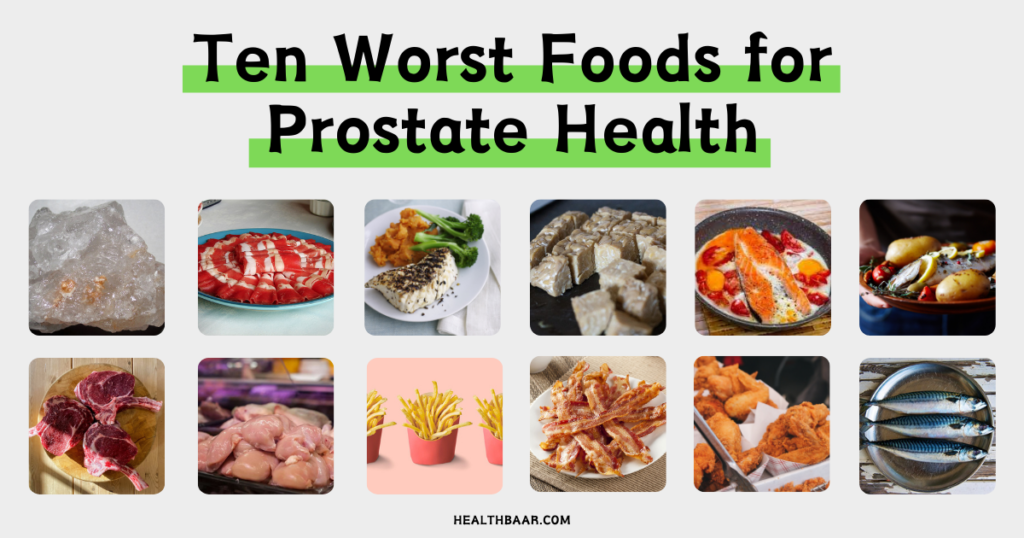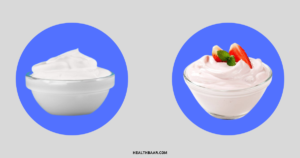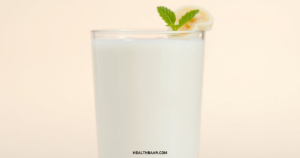
Introduction: Ten Worst Foods for Prostate Health
Maintaining prostate health is extremely important for men, especially as they age. Certain foods can have a negative impact on prostate health. Here are the ten worst foods for prostate health that are considered harmful to prostate health:
1. Dairy products
Dairy products such as milk, cheese, and yogurt contain high amounts of calcium. Some studies have suggested that excessive calcium intake may increase the risk of prostate cancer. High intake of dairy products can also cause hormonal imbalances, which can affect prostate health.
2. Fried and highly processed foods
Fried foods such as french fries, donuts, and chips contain trans fats that can increase inflammation and increase the risk of prostate cancer. Highly processed foods also contain high amounts of sodium and preservatives, which can be harmful to prostate health.
3. Excess saturated fats
High intake of saturated fats is linked to aggressive forms of prostate cancer. This fat is found in meat, butter, and fried foods. High intake of saturated fat can increase inflammation in the body, which can affect prostate health.
4. Sugar and refined carbohydrates
Sugar and refined carbohydrates such as white bread, pastries, and sweets increase blood sugar levels quickly. High blood sugar levels can increase inflammation and can be harmful to prostate health. In addition, refined carbohydrates lack nutrients, which can affect overall health.
5. Grilled and processed meats
Grilled and processed meats contain heterocyclic amines (HCAs) and polycyclic aromatic hydrocarbons (PAHs). These chemicals are formed when cooking meat at high temperatures and may increase the risk of prostate cancer. Processed meats also contain high amounts of sodium and nitrates, which can be harmful to health.
6. Alcohol
Excessive consumption of alcohol can be harmful to prostate health. Excessive consumption of alcohol can cause hormonal imbalances and increase the risk of prostate cancer. Also, alcohol consumption can put pressure on the bladder, leading to urinary problems.
7. Caffeine
Excessive consumption of caffeine can put pressure on the bladder and affect prostate health. Excessive consumption of caffeinated beverages such as coffee, tea, and energy drinks can increase bladder sensitivity, leading to frequent urination.
8. Excessive salt
Excessive salt intake can be harmful to bladder and prostate health. High sodium intake can increase water retention in the body and put pressure on the bladder. Also, excessive salt intake can cause high blood pressure, which can affect overall health.
9. Spicy foods
Spicy foods can increase inflammation and affect prostate health. Excessive consumption of spicy foods can increase bladder sensitivity, leading to burning and pain while urinating.
10. Eggs
Eggs contain high amounts of choline, which may increase the risk of prostate cancer. Some studies have suggested that a high intake of eggs is linked to aggressive forms of prostate cancer. However, eggs also contain protein and other nutrients, so it is not necessary to remove them completely from the diet but should be consumed in balanced amounts.
Healthy Diet for Prostate Health
It is important to follow a healthy diet to maintain prostate health. Here are some tips:
- Fresh fruits and vegetables: Fresh fruits and vegetables contain antioxidants and phytonutrients, which are beneficial for prostate health.
- Whole grains: Whole grains such as brown rice, oats, and quinoa contain fiber and nutrients that help maintain overall health.
- Healthy fats: Healthy fats such as omega-3 fatty acids, found in fish, walnuts, and flax seeds, can help reduce inflammation.
- Enough water: Drinking enough water is important for bladder and prostate health. It helps flush toxins out of the body.
Avoiding these foods and adopting a healthy diet can help maintain prostate health. Adopting a healthy lifestyle will not only improve prostate health but also overall health.


